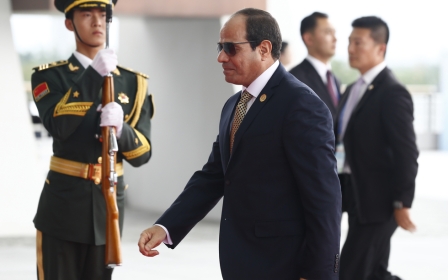Sisi takes the UN stage while he crushes human rights groups at home

Hours before President Abdel Fattah al-Sisi left for the UN General Assembly, an Egyptian court ruled that the assets of five prominent human rights activists and three NGOs would be frozen.
The justification for this ruling was that the groups had received foreign funding without state approval.
The verdict, based on a testimony from Egyptian security agency officials that the work of NGOs is “harming national security, encouraging a state of chaos and a security breakdown”, could lead to criminal proceedings.
"Today is a good sign that criminal indictments are probably imminent," Hossam Bahgat, an investigative journalist and former director of Egyptian Initiative for Personal Rights, who was named in the ruling, told Reuters on Saturday.
Just as the Muslim Brotherhood has been crippled by a fierce clampdown following the 2013 coup, liberal human rights defenders have become a nightmare alarming Sisi’s government.
Not only have they kept a vigil over Sisi’s human rights abuses against dissenters, but also they are backed by the West, fuelling the Egyptian military’s paranoia that western-funded NGOs are attempting to destabilise the state.
Foreign funding is a Catch-22 accusation that all governments since Mubarak have turned to when they were preparing to clamp down on civil society and want to silence rights groups causing them embarrassment.
Meanwhile, Sisi arrived in New York on Sunday to speak before the UN about “Egypt’s political and economic developments”.
Solidity to pure wind
What Egyptian officials call “developments” is a euphemism for something much more sinister. As George Orwell put it in his 1946 essay, they are "designed to make lies sound truthful and murder respectable, and to give an appearance of solidity to pure wind”.
Will Sisi be able to convince the international community and the UN General Assembly about his achievements at a time when the facts on the ground prove the opposite?
In Sisi’s case, the worsening political and economic turmoil, largely caused by his repressive policies, are portrayed as “developments”. Locally, there are mouthpieces whose job is to brainwash the public with Sisi’s image as a “saviour” and to boast of his unproven “achievements”.
In fact, the anti-Western conspiratorial rhetoric that Sisi used for local consumption to justify crushing dissent is likely to be rehashed when he speaks to Western officials on Tuesday into assurances that he is the only alternative to chaos.
Like a narcissistic father who beats up his sons in public to show off his strength among others, the timing of the recent verdict is not coincidental. It fuels Sisi’s ego at the UN where he will be able to show how his government is strong and subordinating other players before the international community.
First, he hit the Muslim Brotherhood at the core. Then he made progress in the counter-terrorism campaign in Sinai. Now, he would like to show off his power over liberal groups. “You would be better off fully accepting and dealing with me or nothing,” he seems to be saying.
In fact, the more Sisi loses popularity at home, the more he seeks to gain international legitimacy in the face of western media criticism. According to the government, putting around 40,000 political opponents in jail, the use of widespread detentions without trial and other atrocities are acceptable because the country is “undergoing a change amidst regional turmoil”.
Since the outbreak of the 2011 uprising, the military repeatedly attempted to scare democracy defenders with the phrase “Do you not see countries around us? Do you want us to be like them?”
In Egypt, no journalist dares to ask Sisi a question related to his repressive policies. Yet in New York, where he will be interviewed by US media, his answer related to the recent court ruling will be more or less “Well, we have an independent judiciary and I cannot intervene in its work, this is democracy, is it not?”
“What about civil society?” they will ask. “We are fighting terrorism, plus the situation in Egypt is different from what it is in the US,” he will probably answer.
US destruction-and-reconstruction policy
In fact, US policy toward Egypt is two-faced. Egypt has received an annual $1.3bn military package from Washington since 1975. In addition, the US-government USAID allocates around $50m each year to promote democracy and human rights in Egypt.
The aid, mostly paid by US taxpayers, funds conflicting camps, the oppressor and the oppressed. On the one hand, it equips the military with weapons used to crush civil society, and on the other hand, it funds and backs battered civil society organisations.
The US destruction-and-reconstruction policy, adopted across the region, is aimed at maintaining US interests on both sides. Moreover, Washington is using its leverage in each camp in order to guarantee the loyalty of both sides to the US. It’s the same policy that backed Mubarak and now Sisi.
Democratic presidential candidate Hillary Clinton, who met Sisi yesterday, is the same person who boasted about walking in Tahrir Square after the 18-day uprising and meeting activists who inspired it.
Clinton's nemesis, Republican candidate Donald Trump, who earlier called for a complete ban on Muslims entering the US, expressed “his high regard for peace-loving Muslims" when he met Sisi in New York.
Paranoia-fuelled crackdown
The attack on civil society began shortly after the Egyptian uprising, fuelled by conspiracy paranoia of the potential for a Western “soft power” intervention. The military junta - which governed the country for around 16 months after the ousting of Mubarak – dealt a blow to US and German pro-democracy groups, including the National Democratic Institute (NDI), International Republican Institute (IRI), Freedom House, and German-funded Konrad Adenauer-Stiftung.
Despite the Western outcry at the time, the military’s suspicions of a Western intervention, regardless of the intention of these groups, was understandable, given the political motivations related to some of these organisations.
For instance, NDI is funded by the US Congress and former secretary of state Madeleine Albright, who set the stage of a human catastrophe in Iraq with the devastating UN sanctions of the 1990s, is the chair. Meanwhile, the IRI is chaired by pro-war Republican Senator John McCain.
In 2013, a court ordered the closure of the foreign organisations and gave jail sentences to 43 NGO staff ranging from one to five years in jail, including 15 Americans who had already fled the country after a US-Egyptian ransom deal.
The second blow against civil society began in 2013 when Sisi launched a fierce crackdown on Muslim Brotherhood-affiliated organisations, including its charity activities. The group’s NGOs were widely spread in rural and underprivileged areas, long neglected by Egyptian governments.
Standing alone
As the Muslim Brotherhood became fragmented, with thousands of members put in jail and others fleeing the country, Egyptian rights defenders and pro-democracy NGOs became the only groups able to challenge Sisi’s government.
Thanks to their Western connections with international groups who hold the same values, they have more influence than the crushed Islamists, especially after the rise of the radical militants of the Islamic State group that fuelled the Islamophobia trend in the West.
In March, 17 NGOs released a joint statement condemning an “orchestrated onslaught” on civil society by Sisi government. The statement shed the light on retaliatory attacks which came after a group filed a memo to the UN High Commissioner for Human Rights detailing all types of abuses linked to the Egyptian government.
As the crackdown intensified, the European Parliament passed a resolution condemning the worsening human rights situation in Egypt in the wake of Italy’s outcry over suspicions of government links to the murder of Italian academic Giulio Regeni.
Human rights group have landed some serious blows against Sisi. In June, an Egyptian court ruled that the country could not hand over the Red Sea islands of Tiran and Sanfir to Saudi Arabia as Sisi had promised. The heroes in this case is a group of rights lawyers.
“We are just a small fraction of the defenders movement, the biggest part is on the street, including volunteers and January 25th revolutionaries,” said Gamal Eid, one of the convicted rights defenders in the latest ruling.
No doubt none of this will feature when Sisi delivers his speech at the UN today. But a quick search on Google for civil society news in Egypt is enough to show that his audience will understand that it’s all much ado about nothing.
- Muhammad Mansour is a journalist from Egypt, who covered the Arab uprisings, and who writes about Egyptian affairs, Sinai insurgency and broader Middle Eastern issues. For more details, visit www.muhammadmansour.com.
The views expressed in this article belong to the author and do not necessarily reflect the editorial policy of Middle East Eye
Photo: Egyptian President Abdel Fattah el-Sisi waits for a meeting with Democratic presidential nominee Hillary Clinton at the Palace Hotel on 19 September 2016 in New York (AFP)
Stay informed with MEE's newsletters
Sign up to get the latest alerts, insights and analysis, starting with Turkey Unpacked
Middle East Eye delivers independent and unrivalled coverage and analysis of the Middle East, North Africa and beyond. To learn more about republishing this content and the associated fees, please fill out this form. More about MEE can be found here.





